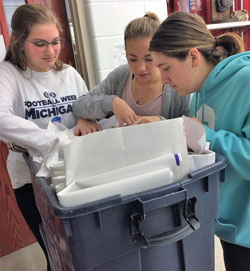By the time students reach their last year of middle school, they likely know what science teacher Curt Gerbers calls: “the big idea – humans impact the environment and we can control how much we actually do.”
But there is much more to learn.
In addition to classroom discussions, a trip to the recycling center, a waste-to-energy plant, and the landfill, gave the eighth-graders a bigger picture of what happens to the waste they create at school and at home.

What we learned
“The warehouse (at the energy plant) is full of trash is at least 100 feet high,” said eighth-grader Will Hanson.
“Not all that is sent to the center ends up being recycled because a lot of things that can’t be recycled are put in there,” said Lesie Bockhein.
Students were also surprised to see some of the things that end up at the landfill – a “whole boat,” road kill, a truckload of watermelon and another of cookie dough.
But while some of the more unusual items surprised them, the amount generally did not.
“We learned that 70 percent of what people trash could be recycled,” said Lizette Sororlrl. “Many people have no interest bringing things to recycle,” said Madilynn Roe.
“We also learned about creating energy,” said Victor Salas.
“Around the landfill there are little pipes running through the ground that collect all the methane and it produces a lot of energy,” said Devin Bair. “If something shuts down, it could supply electricity to all the houses around there.”
Since the course teaches about human impact on the environment, the lessons also tie in how air is polluted through electricity generation, according to Gerbers.
“The waste-to-energy facility and the landfill produce electricity, so we’ll discuss them along with natural gas, coal, and nuclear power plants in how they affect our atmosphere,” he said. “This also leads to discussions on renewable and non-renewable sources of energy and climate change.”

Doing their part
It has been almost a decade since the Kent City Middle School started a formal recycling program. “At that time, some recycling had already been going on, but not in all classrooms and not in an organized manner,” said Gerbers.
The goal was then and continues to be “to reduce the amount of trash Kent City Middle School puts in landfills.”
Eighth-grade students take turns making sure everything that can be composted or recycled is.
Three mornings a week, a few students leave the science classroom to pick up recycling from various classrooms, offices, and copy rooms around the building. They also assist in composting leftovers from the cafeteria.
“Even though it is important to save our world, not nearly everyone does it,” said Victor Salas.
Many of the students said that their families recycle but few compost at home. “We do,” said Nicholas Van Houten, “but it easy for us because we have a farm.”
“Everything you get rid of has to go somewhere. We got to see where it actually goes, from most desirable outcome – reusing/recycling to least desirable – landfill,” said Gerbers. “My hope is this understanding will motivate students to think more about the trash they create and take action to reduce it.”










